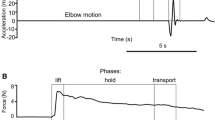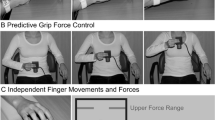Abstract
We describe adjustments in grip force as a consequence of fluctuations in inertial load force during vertical movements of the upper limb in a patient with cerebellar degeneration. Normally grip force is adapted to load-force fluctuations, in particular to the maximum load force, which occurs early in upward movements and late in downward movements. Increased grip force during movement was observed in the patient, but the timing of maximum grip force was not different between upward and downward movements. This suggests impaired cerebellar prediction of the dynamic consequences of voluntary movement.
Similar content being viewed by others
Author information
Authors and Affiliations
Additional information
Received: 25 August 1998 / Accepted: 23 March 1999
Rights and permissions
About this article
Cite this article
Babin-Ratté, S., Sirigu, A., Gilles, M. et al. Impaired anticipatory finger grip-force adjustments in a case of cerebellar degeneration. Exp Brain Res 128, 81–85 (1999). https://doi.org/10.1007/s002210050821
Issue Date:
DOI: https://doi.org/10.1007/s002210050821




